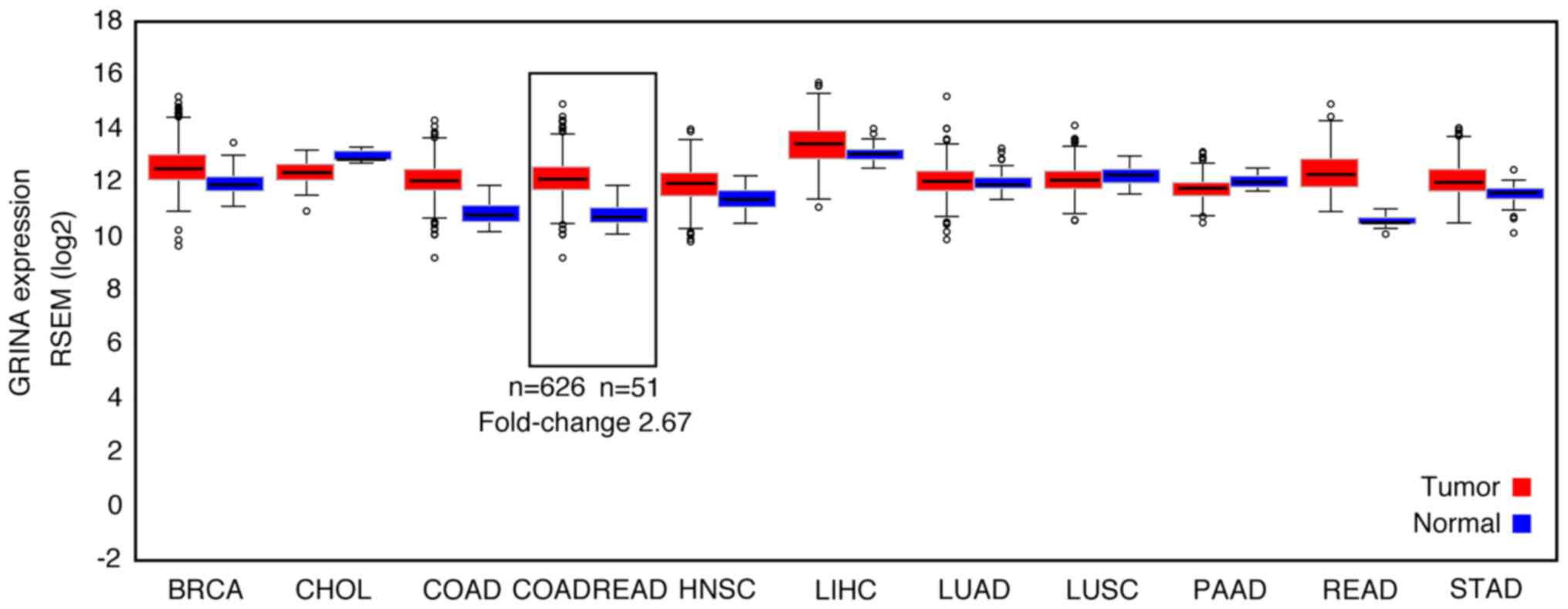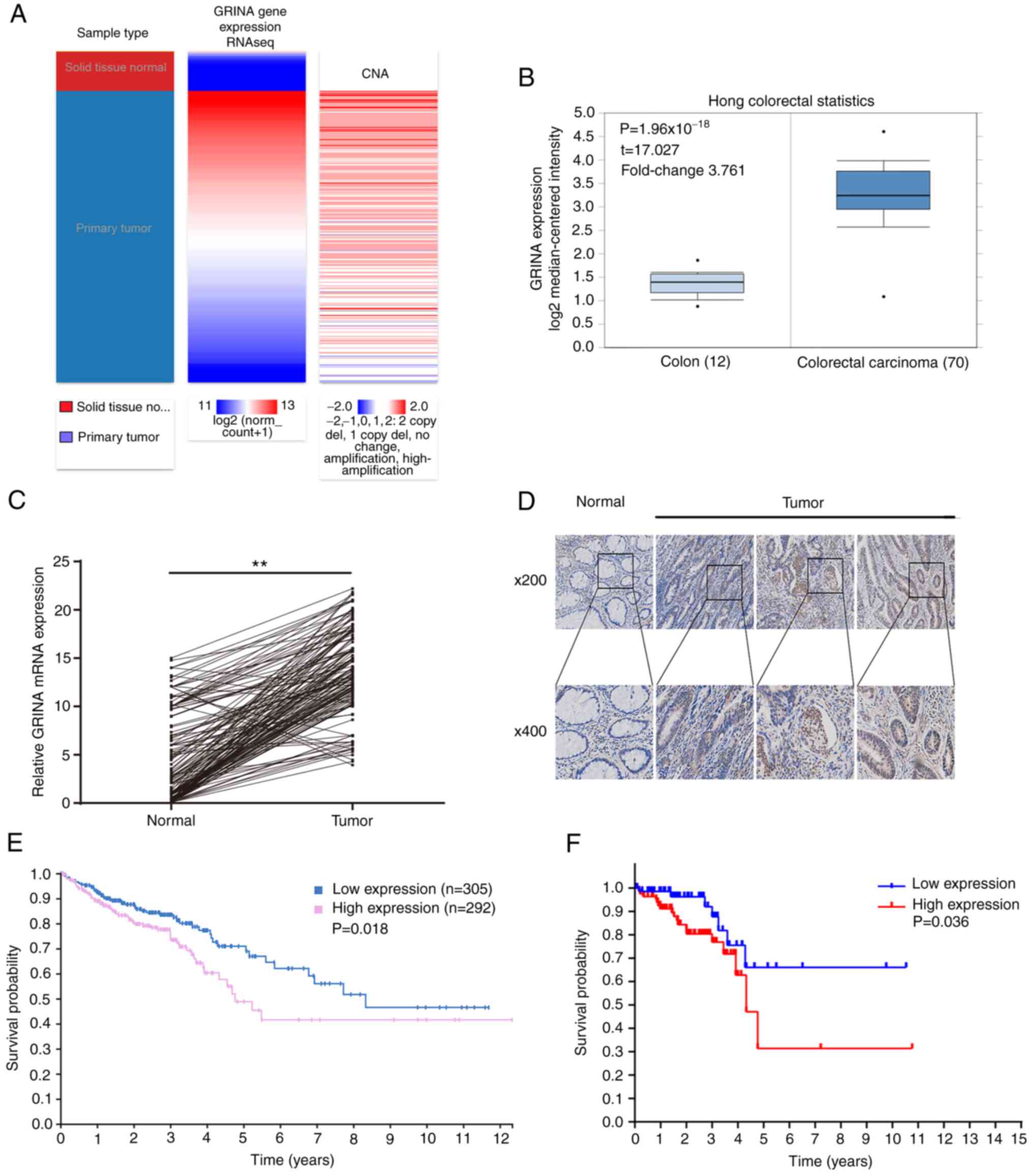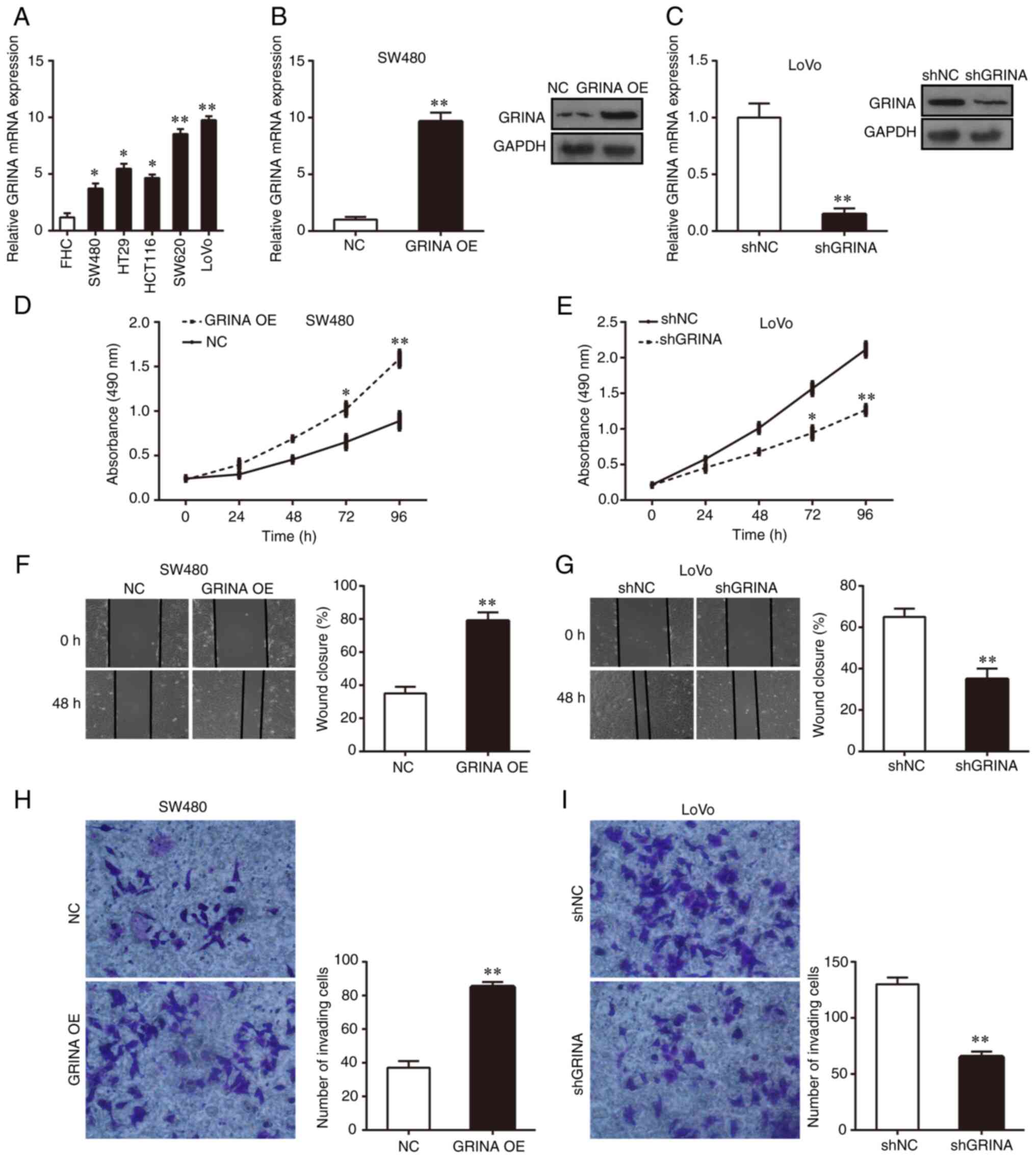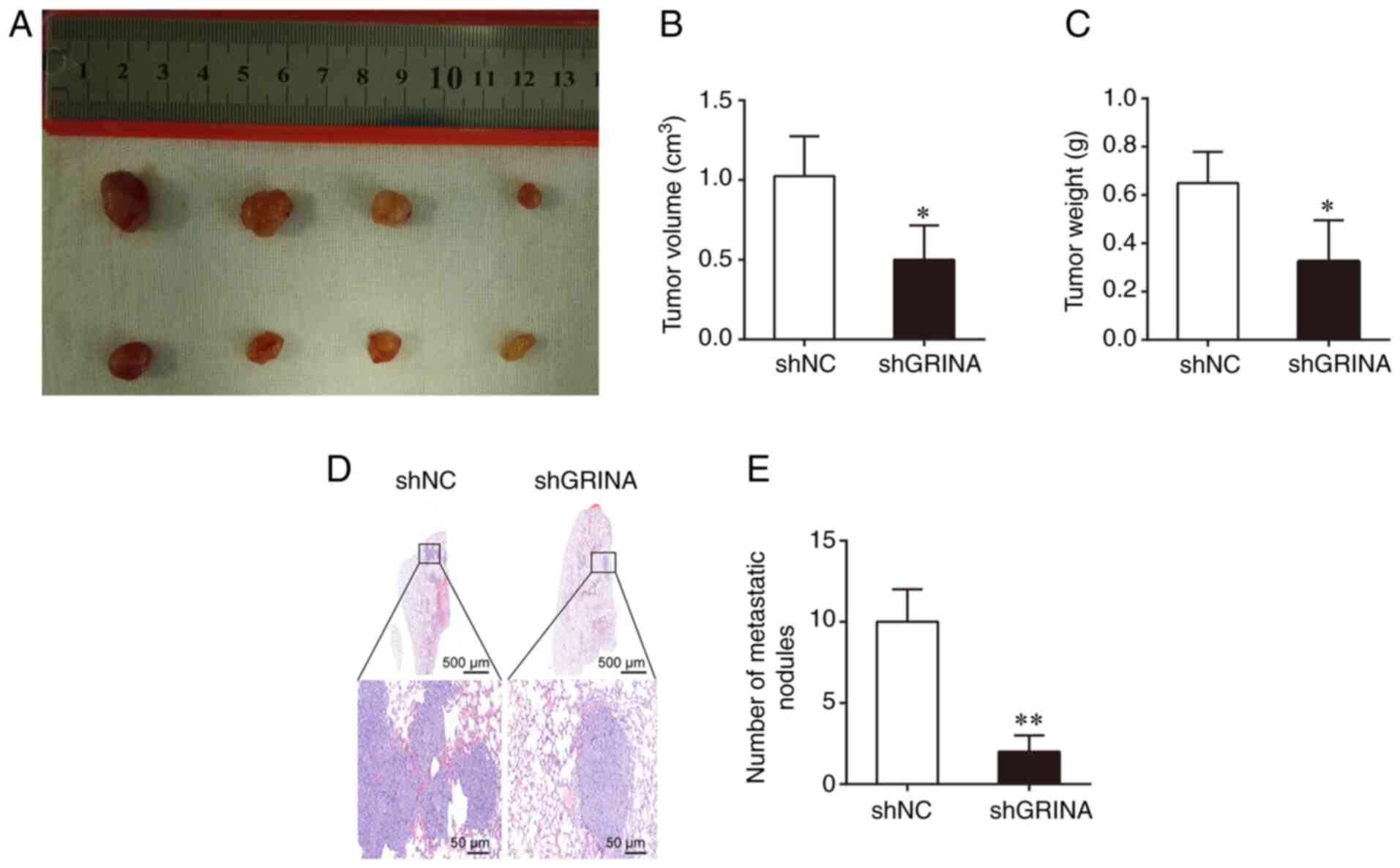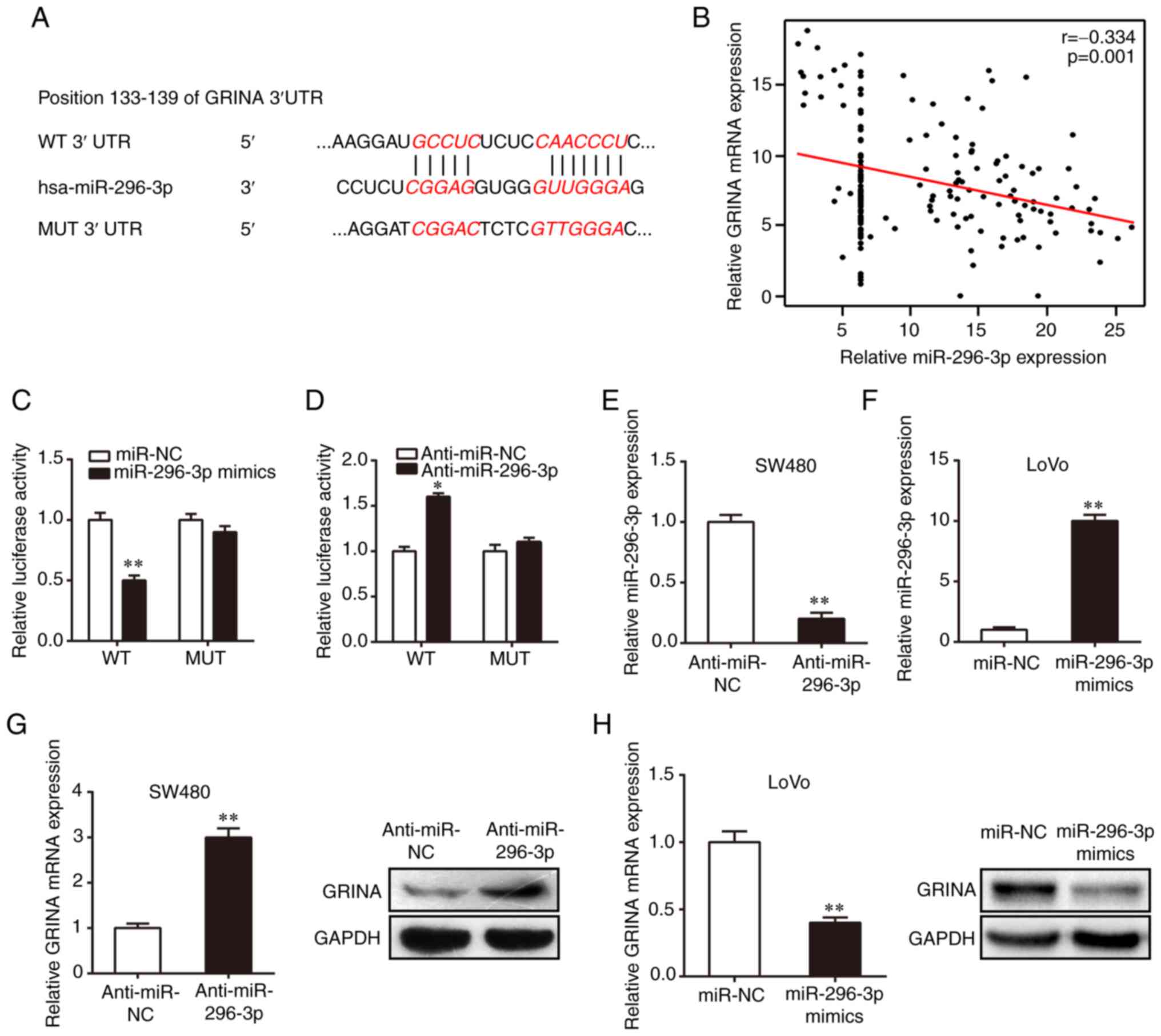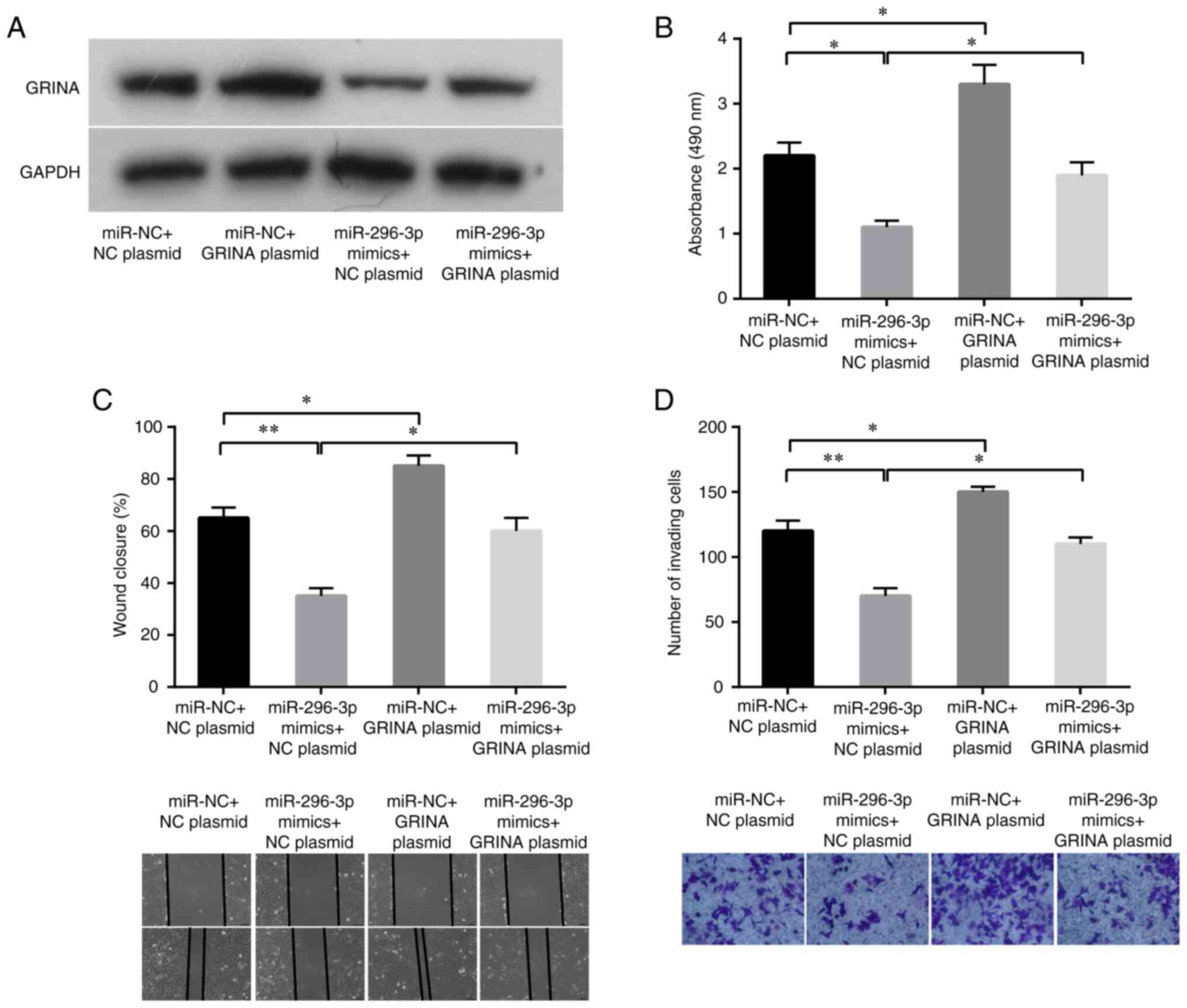|
1
|
Troiani T, Zappavigna S, Martinelli E,
Addeo SR, Stiuso P, Ciardiello F and Caraglia M: Optimizing
treatment of metastatic colorectal cancer patients with anti-EGFR
antibodies: Overcoming the mechanisms of cancer cell resistance.
Expert Opin Biol Ther. 13:241–255. 2013. View Article : Google Scholar : PubMed/NCBI
|
|
2
|
Siegel RL, Miller KD and Jemal A: Cancer
statistics, 2017. CA Cancer J Clin. 67:7–30. 2017. View Article : Google Scholar : PubMed/NCBI
|
|
3
|
Chen W, Zheng R, Baade PD, Zhang S, Zeng
H, Bray F, Jemal A, Yu XQ and He J: Cancer statistics in China,
2015. CA Cancer J Clin. 66:115–132. 2016. View Article : Google Scholar : PubMed/NCBI
|
|
4
|
Collins C, Duff C, Duncan AM,
Planells-Case R, Sun W, Norremolle A, Michaelis E, Montal M, Worton
R and Hayden MR: Mapping of the human NMDA receptor subunit
(NMDAR1) and the proposed NMDA receptor glutamate-binding subunit
(NMDARA1) to chromosomes 9q34.3 and chromosome 8, respectively.
Genomics. 17:237–239. 1993. View Article : Google Scholar : PubMed/NCBI
|
|
5
|
North WG, Gao G, Memoli VA, Pang RH and
Lynch L: Breast cancer expresses functional NMDA receptors. Breast
Cancer Res Treat. 122:307–314. 2010. View Article : Google Scholar : PubMed/NCBI
|
|
6
|
North W, Liu F, Tian R, Abbasi H and
Akerman B: NMDA receptors are expressed in human ovarian cancer
tissues and human ovarian cancer cell lines. Clin Pharmacol.
7:111–117. 2015.PubMed/NCBI
|
|
7
|
Xu DH, Li Q, Hu H, Ni B, Liu X, Huang C,
Zizhen ZZ and Zhao G: Transmembrane protein GRINA modulates aerobic
glycolysis and promotes tumor progression in gastric cancer. J Exp
Clin Cancer Res. 37:3082018. View Article : Google Scholar : PubMed/NCBI
|
|
8
|
Gehlenborg N, Noble MS, Getz G, Chin L and
Park PJ: Nozzle: A report generation toolkit for data analysis
pipelines. Bioinformatics. 29:1089–1091. 2013. View Article : Google Scholar : PubMed/NCBI
|
|
9
|
Goldman MJ, Craft B, Hastie M, Repečka K,
McDade F, Kamath A, Banerjee A, Luo Y, Rogers D, Brooks AN, et al:
Visualizing and interpreting cancer genomics data via the xena
platform. Nat Biotechnol. 38:675–678. 2020. View Article : Google Scholar : PubMed/NCBI
|
|
10
|
Rhodes DR, Yu J, Shanker K, Deshpande N,
Varambally R, Ghosh D, Barrette T, Pandey A and Chinnaiyan AM:
ONCOMINE: A cancer microarray database and integrated data-mining
platform. Neoplasia. 6:1–6. 2004. View Article : Google Scholar : PubMed/NCBI
|
|
11
|
Uhlén M, Fagerberg L, Hallström BM,
Lindskog C, Oksvold P, Mardinoglu A, Sivertsson Å, Kampf C,
Sjöstedt E, Asplund A, et al: Proteomics. Tissue-based map of the
human proteome. Science. 347:12604192015. View Article : Google Scholar : PubMed/NCBI
|
|
12
|
Fan XJ, Wan XB, Yang ZL, Fu XH, Huang Y,
Chen DK, Song SX, Liu Q, Xiao HY, Wang L and Wang JP: Nail promotes
lymph node metastasis and twist enhances tumor deposit formation
through epithelial-mesenchymal transition in colorectal cancer. Hum
Pathol. 44:173–180. 2013. View Article : Google Scholar : PubMed/NCBI
|
|
13
|
Livak KJ and Schmittgen TD: Analysis of
relative gene expression data using real-time quantitative PCR and
the 2(-Delta Delta C(T)) method. Methods. 25:402–408. 2001.
View Article : Google Scholar : PubMed/NCBI
|
|
14
|
Xuan Y, Yang H, Zhao L, Lau WB, Lau B, Ren
N, Hu Y, Yi T, Zhao X, Zhou S and Wei Y: MicroRNAs in colorectal
cancer: Small molecules with big functions. Cancer Lett.
360:89–105. 2015. View Article : Google Scholar : PubMed/NCBI
|
|
15
|
He Z, Yu L, Luo S, Li M, Li J, Li Q, Sun Y
and Wang C: miR-296 inhibits the metastasis and
epithelial-mesenchymal transition of colorectal cancer by targeting
S100A4. BMC Cancer. 17:1402017. View Article : Google Scholar : PubMed/NCBI
|
|
16
|
Zhang Z, Zhong X, Xiao Y and Chen C:
MicroRNA-296 inhibits colorectal cancer cell growth and enhances
apoptosis by targeting ARRB1-mediated AKT activation. Oncol Rep.
41:619–629. 2018.PubMed/NCBI
|
|
17
|
Kalariti N, Pissimissis N and Koutsilieris
M: The glutamatergic system outside the CNS and in cancer biology.
Expert Opin Investig Drugs. 14:1487–1496. 2005. View Article : Google Scholar : PubMed/NCBI
|
|
18
|
Kang M, Cho JH, Koo JK, Noh SU, Kim MY,
Kang H, Oh ST, Kim HO and Park YM: The expression of NMDA receptor
1 correlates with clinicopathological parameters in cutaneous
squamous cell carcinoma. Ann Dermatol. 21:382–388. 2009. View Article : Google Scholar : PubMed/NCBI
|
|
19
|
Choi SW, Park SY, Hong SP, Pai H, Choi JY
and Kim SG: The expression of NMDA receptor 1 is associated with
clinicopathological parameters and prognosis in the oral squamous
cell carcinoma. J Oral Pathol Med. 33:533–537. 2004. View Article : Google Scholar : PubMed/NCBI
|
|
20
|
Stepulak A, Sifringer M, Rzeski W,
Endesfelder S, Gratopp A, Pohl EE, Bittigau P, Felderhoff-Mueser U,
Kaindl AM, Bührer C, et al: NMDA antagonist inhibits the
extracellular signal-regulated kinase pathway and suppresses cancer
growth. Proc Natl Acad USA. 102:15605–15610. 2005. View Article : Google Scholar : PubMed/NCBI
|
|
21
|
Watanabe K, Kanno T, Oshima T, Miwa H,
Tashiro C and Nishizaki T: The NMDA receptor NR2A subunit regulates
proliferation of MKN45 human gastric cancer cells. Biochem Biophys
Res Commun. 367:487–490. 2008. View Article : Google Scholar : PubMed/NCBI
|
|
22
|
Rochette PJ, Bastien N, Lavoie J, Guérin
SL and Drouin R: SW480, a p53 double-mutant cell line retains
proficiency for some p53 functions. J Mol Biol. 352:44–57. 2005.
View Article : Google Scholar : PubMed/NCBI
|
|
23
|
Bras-Gonçalves RA, Rosty C, Laurent-Puig
P, Soulié P, Dutrillaux B and Poupon MF: Sensitivity to CPT-11 of
xenografted human colorectal cancers as a function of
microsatellite instability and p53 status. Br J Cancer. 82:913–923.
2000. View Article : Google Scholar : PubMed/NCBI
|
|
24
|
Song K, Kim RN, Jeon S, Kim HI, Choi YL
and Shin YK: Abstract 5171: An integrated analysis of copy number
alteration and global gene expression reveals potential oncogenes
underlying stomach cancer. Cancer Res. 74:51712014.
|
|
25
|
Lv L and Wang X: MicroRNA-296 targets
specificity protein 1 to suppress cell proliferation and invasion
in cervical cancer. Oncol Res. 26:775–783. 2017. View Article : Google Scholar : PubMed/NCBI
|
|
26
|
Li H, Li J, Shi B and Chen F: MicroRNA-296
targets AKT2 in pancreatic cancer and functions as a potential
tumor suppressor. Mol Med Rep. 16:466–472. 2017. View Article : Google Scholar : PubMed/NCBI
|
|
27
|
Li H, Ouyang XP, Jiang T, Zheng XL, He PP
and Zhao GJ: MicroRNA-296: A promising target in the pathogenesis
of atherosclerosis? Mol Med. 24:122018. View Article : Google Scholar : PubMed/NCBI
|
|
28
|
Ma H, Zhang X, Li N, Lu X, Wei Y, Yuan N,
Tian G and Li S: Glutamate receptor, ionotropic, N-methyl
D-aspartate-associated protein 1, a potential target of miR-296,
facilitates proliferation and migration of rectal cancer cells.
Biosci Biotech Bioch. 84:2077–2084. 2020. View Article : Google Scholar : PubMed/NCBI
|















